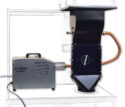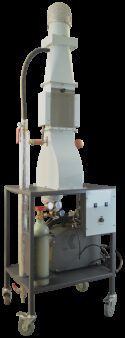Ancillary
AF1300Z
BASIC LIFT AND DRAG BALANCE
A two-component balance that measures lift and drag forces on models mounted in the AF1300 Subsonic Wind Tunnel.
If you have any questions or you'd like to discuss a product, please call us.
+44 1159 722 611BASIC LIFT AND DRAG BALANCE
A two-component balance which measures the lift and drag forces on models mounted in TecQuipment’s Subsonic Wind Tunnel (AF1300).
The balance mechanism enables test models with a rigid support arm to be mounted and held securely in position in the working section of the wind tunnel. The arm transmits the force on the test model directly to a strain gauged load cell. The load cell is connected to a readout unit with a digital display, which is powered by a desktop power supply (included).
In addition, the equipment is fully compatible with TecQuipment’s Versatile Data Acquisition System (VDAS®) and can quickly and conveniently connect to the frame-mounting interface unit (VDAS-F, not included). Using VDAS® enables accurate real-time data capture, monitoring, display, calculation and charting of all relevant parameters on a suitable computer (computer available separately).
To measure the lift and drag forces on models (aerofoils for example, available separately), the balance mounts on the side of the working section of the wind tunnel. The drag force is measured first, then students rotate the balance mechanism through 90 degrees and repeat the test to measure the lift force. When mounted in the base of the wind tunnel working section, the balance measures the drag force only. This is useful for a variety of investigations such as wind loadings on tall buildings. It can also be used to measure drag forces on model vehicles enabling students to determine and compare coefficients of drag.
Note: For experiments requiring measurement of pitching moment as well as drag and lift forces, a three-component balance, such as TecQuipment’s AF1300t, is required.




